In "The Black Dwarf," Walter Scott explores complex themes of identity, societal alienation, and moral ambiguity against the backdrop of Scotland's early 18th century. This novella employs a romantic literary style, showcasing Scott's keen understanding of character development through the enigmatic figure of the dwarf, who embodies both villainy and sympathy. The story unfolds within the parameters of the Gothic tradition, drawing on elements of suspense and emotional intensity while engaging with the socio-political issues of the time, particularly the stratification of class and the challenges of the marginalized. Walter Scott, often heralded as the father of historical fiction, crafted this work during a period of significant personal and societal upheaval. His own Scottish lineage and deep-rooted appreciation for Scottish history profoundly influenced his writings. "The Black Dwarf" reflects his fascination with the human psyche in relation to social structures, a theme that emerges from Scott's own encounters with the complexities of identity and status in his contemporary society. This novella is recommended for readers who appreciate a blend of historical narrative and psychological depth. Scott's ability to weave moral complexity with rich, vivid storytelling invites readers to reflect on the nature of humanity. "The Black Dwarf" serves as a compelling entry point into the rich tapestry of Scott's oeuvre and remains a resonant critique of social hierarchies.














